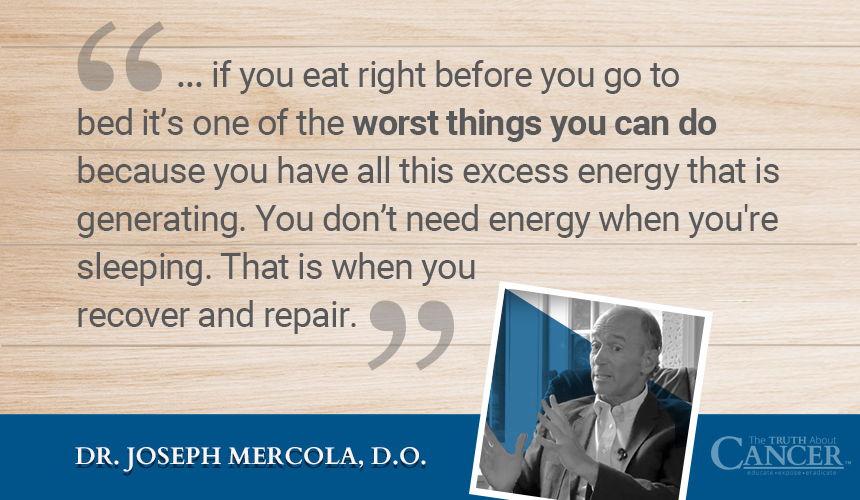Ty Bollinger: So how would somebody get their body into the state of ketosis where you are burning fat instead of sugar?
Dr. Mercola: Well, I don’t know that it necessarily has to be ketosis. And it is my understanding that it has actually been shown there are a number of good studies that show it is quite effective for treatment of certain types of malignancies, specifically brain cancers.
It probably is generally used for most malignancies, but the typical strategy one would do, I think, is to really focus on the quality of the food and the timing of the food. So, I like to call it the 3-8-3. That is, basically, don’t eat for at least—at least—three hours before you go to bed. Sleep for eight hours, because sleep is another crucial component for healing, and if you are only sleeping four or five hours a night, your body’s immune system is not going to be optimized to fight these malignancies. And then, wait for at least three hours before you eat.
Now, you can modify that, too, basically by moving your breakfast forward. But the other approach is you can eat your breakfast, especially if you are going to have an active work day, like a farmer, or some vigorous occupation that you are involved in, and then have a pretty big breakfast, and even a bigger lunch, but then skip your dinner.
So then, actually, even extend it, instead of three hours, maybe four, five or six hours before you go to bed. And I think that may be more beneficial for a really good reason, in that it tends to improve your mitochondrial function.
You might wonder what mitochondria are. They are derivatives of bacteria, ancient bacteria, that are embedded in just about every one of our cells, and each one of our cells has about 100 to 100,000 of these things. You might say, “What are they?” Well, these are the powerhouses where our body is actually able to burn fuel. When you eat food, whatever type of food it is, it doesn’t magically turn to energy. It has to be converted in some process, and the primary process is using the mitochondria.
And the mitochondria have these electron transport chains in there where they actually incorporate the oxygen from the air you breathe, and the broken down fuel substrate, such as fat and glucose, and they combine those together in these electron transfer chains. And they basically produce electrons, get transferred to substrates like ATP, adenosine triphosphate, that circulate around and transfer this energy into your body.
Here is the problem, though, because if you are not able to burn fat effectively, and you have this excess of sugar, or if you eat before you go to bed − one of the worst things you can do − what happens is you have this inefficiency in your mitochondria. So when you produce energy in your body it doesn’t occur there magically, there is this process that occurs. And you take these substrates, the fuels that are broken down to either the carbohydrates or the fats, and it combines it with the oxygen.
And there is usually some residual. When you are burning any fuel for energy there is a byproduct. There are waste products. Some fuel is minimal, like water would be the waste product when you are converting hydrogen for fuel. That’s a pretty innocuous byproduct.
But in our own mitochondria they have the potential to produce excessive electrons, and when you do that, your body has to compensate for that with antioxidants. And if you are using the energy, then it is no problem because you generate it, you use it, and it flows, and there is very little excess waste product.
But when you don’t use the energy, if you are not being able to be able to burn fat, and you have a lot of sugar that you are building up, then you have this excess energy, and then these electrons build up, it causes massive amounts of free radicals which can damage your tissues, your cell membranes, your DNA, can actually prematurely kill your mitochondria, and certainly, prematurely age you. There are many experts who believe in the mitochondrial theory of aging.
So we want to preserve the function and the health of the mitochondria and one of the best ways you can do this is by simple strategies like delaying the time, or not eating before you go to bed. Simple concept, right?
But we didn’t know that if you eat right before you go to bed it’s one of the worst things you can do because you have all this excess energy that is generating. You don’t need energy when you’re sleeping, that is when you recover and repair. Your body has more than enough fuel to compensate for that.



















So why do I feel tired after a meal? I usually fall asleep right after dinner and it is a very good xlddp indeed.